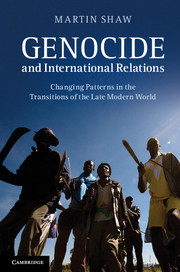SOLE-AUTHORED BOOKS IN ORDER OF PUBLICATION (for edited works, see Bibliography)
POLITICAL RACISM: Brexit and Its Aftermath
Newcastle upon Tyne: Agenda, 2022
 WHAT IS GENOCIDE? Second Edition
WHAT IS GENOCIDE? Second Edition
Cambridge: Polity, 2015
Fully revised an updated edition of my 2007 book (see below). This edition includes a new chapter on Raphael Lemkin, significantly extending my critique of his approach in the light of recent research, as well as fuller treatment of the idea of ‘structure’ in understanding genocide.
The new edition also improves the presentation of the work and its suitability for teaching.
GENOCIDE AND INTERNATIONAL RELATIONS: Changing Patterns in the Upheavals of the Late Modern World
Cambridge University Press, October 2013
Historical study of genocide in changing international contexts, from colonization to European genocide, to Cold War, decolonizing and post-colonial genocide, and the genocidal violence of today’s messy civil wars and democratizations.
‘Un ouvrage indispensable pour comprendre les liens entre guerre, génocide, et relations internationales.’ (An indispensible work for understanding the links between war, genocide and international relations) – Olivier Schmitt
Polity, 2007
Winner of the Choice Outstanding Academic Title award: read Chapter 2
This book proposes a way through the confusion surrounding the idea of genocide: ‘a model of conceptual clarity and cogent argument’ (Michael Mann).
Makes ‘genocide a viable category with which to understand perhaps the most disturbing aspects of the past and present world’ (A. Dirk Moses)
‘This is an excellent, exciting book. It is one of the books everyone should read – especially in the field of genocide studies – and most genocide scholars and students will probably do so.’ (James Gow, Journal of Genocide Research)
‘There is much to be admired in this book. It is rigorous and robust and puts forth a compelling case. … Shaw’s idea of genocide as a form of warfare … is rich, compelling and important.’ (Alex Bellamy, International Affairs)
See also Pablo Veyrat in War and Media Network, Brian Brivati in Democratiya
| their risks and ours: the Iraq disaster in perspective |
THE NEW WESTERN WAY OF WAR: RISK-TRANSFER WAR AND ITS CRISIS IN IRAQ 2005
‘The Western way of war, with its deep risk-aversion for its own soldiers and citizens, claims the ultimately impossible standard of “clean” or at least “cleaner” war. Its pretensions to civilian protection are easily represented as hypocritical – its thousands of civilian victims speak otherwise.’
Written in 2004 and published in 2005, events since have only made this critique more relevant.
Read the concluding chapter, ‘A way of war in crisis’ / Martin Woollacott’s Guardian review / War and Media review / interview with Martin Shaw by Alan Johnson / order the book
Italian translation, L’Occidente Alla Guerra, published by EGEA Bocconi University Press, 2006
| textbook |
WAR AND GENOCIDE: ORGANIZED KILLING IN MODERN SOCIETY 2003
A critical introduction to war and genocide studies (2003); breaks new ground in systematically linking the two fields: ‘very suitable as an undergraduate textbook. It is also written in a very direct and admirably accessible style … . Reading Shaw’s book is a pleasure, even though its topic is far from pleasant.’ – Australian Journal of Political Science. ‘
The book contains a unique narrative regarding the relationship between war and genocide.’ – Social and Legal Studies.
| a book that rewrites the globalization debate |
THEORY OF THE GLOBAL STATE: GLOBALITY AS UNFINISHED REVOLUTION 2000.
Read Chapter 1 or order the book. Read the English text of the new post-9/11 Introduction published in the Italian edition. .
 ‘Theorizing globalization without the state is like playing Hamlet without the Prince, as Martin Shaw nicely puts it. …. The debate becomes trapped in this stale dilemma of globalization versus the nation-state. Shaw’s identification of this trap and his insistence on the need to escape is useful and timely.’ Leo Panitch
‘Theorizing globalization without the state is like playing Hamlet without the Prince, as Martin Shaw nicely puts it. …. The debate becomes trapped in this stale dilemma of globalization versus the nation-state. Shaw’s identification of this trap and his insistence on the need to escape is useful and timely.’ Leo Panitch
‘an important and innovative study … explores uncharted terrain.’ William I Robinson, American Political Science Review, 95, 4, 2001, pp. 1045-7. See my comments on Bill Robinson’s criticisms of the book.
‘This notion of a global state is an interesting idea and it is clearly defined in a thoroughgoing critique of international relations theory. The key problem with it is whether it is at all plausible. I think not.’ Paul Hirst
| key research |
CIVIL SOCIETY AND MEDIA IN GLOBAL CRISES: REPRESENTING DISTANT VIOLENCE 1996
Read Part III, From managed media to active representation: the Gulf War and the Kurdish refugee crisis
 ‘Martin Shaw is, somewhat inexplicably, the first scholar to turn his attention to the Iraqi Civil war of 1991, which began a few days after the end of Operation Desert Storm. Shaw’s primary interest is in how civil society – particularly the press – “represents” distant events. .. His choice of focusing primarily (though not exclusively) on the Kurdish exodus, which involved some 2 million people, is noteworthy because it the only substantial work that traces the first two months of the Iraqi Civil War and its aftermath and seeks to determine whether the media may have had an effect on the decisionmaking process of the British executive. The citation and research is excellent. Its primary flaw is that the study overreaches its conclusions. On the whole, however, a valuable argument, a highly worthy subject matter, and extremely well cited for use by interested researchers.’ Derek Miller
‘Martin Shaw is, somewhat inexplicably, the first scholar to turn his attention to the Iraqi Civil war of 1991, which began a few days after the end of Operation Desert Storm. Shaw’s primary interest is in how civil society – particularly the press – “represents” distant events. .. His choice of focusing primarily (though not exclusively) on the Kurdish exodus, which involved some 2 million people, is noteworthy because it the only substantial work that traces the first two months of the Iraqi Civil War and its aftermath and seeks to determine whether the media may have had an effect on the decisionmaking process of the British executive. The citation and research is excellent. Its primary flaw is that the study overreaches its conclusions. On the whole, however, a valuable argument, a highly worthy subject matter, and extremely well cited for use by interested researchers.’ Derek Miller
Order Civil Society and Media in Global Crises.
POST-MILITARY SOCIETY: DEMILITARIZATION, MILITARISM AND WAR AT THE END OF THE TWENTIETH CENTURY 1991
The sociology of contemporary militarism.
| two seminal works – read the full texts online |
GLOBAL SOCIETY AND INTERNATIONAL RELATIONS: SOCIOLOGICAL CONCEPTS AND POLITICAL PERSPECTIVES 1994
One of the first books to fully present the challenge of globality to IR. Includes chapters on global society; Giddens’ state theory; security – critique of Buzan, Booth, Waever; international society theory; etc.
DIALECTICS OF WAR: AN ESSAY ON THE SOCIAL THEORY OF WAR AND PEACE 1988
This pathbreaking work challenged the mutual neglect of strategic and social theory. In a historically based argument, it proposed that we need to examine the inner workings of warfare as a social arena, and advanced the arguments for historical pacifism.
What is Genocide? Winner of the Choice Outstanding Academic Title award
This book proposes a way through the confusion surrounding the idea of genocide: ‘a model of conceptual clarity and cogent argument’ (Michael Mann). Makes ‘genocide a viable category with which to understand perhaps the most disturbing aspects of the past and present world’ (Dirk A. Moses) ‘This is an excellent, exciting book. It is one of the books everyone should read – especially in the field of genocide studies – and most genocide scholars and students will probably do so.’ (James Gow, Journal of Genocide Research) ‘There is much to be admired in this book. It is rigorous and robust and puts forth a compelling case. … Shaw’s idea of genocide as a form of warfare … is rich, compelling and important.’ (Alex Bellamy, International Affairs) See also Pablo Veyrat in War and Media Network, Brian Brivati in Democratiya
Read Chapter 2, Neglected Foundations: Genocide as Social Destruction and its Connections with War




